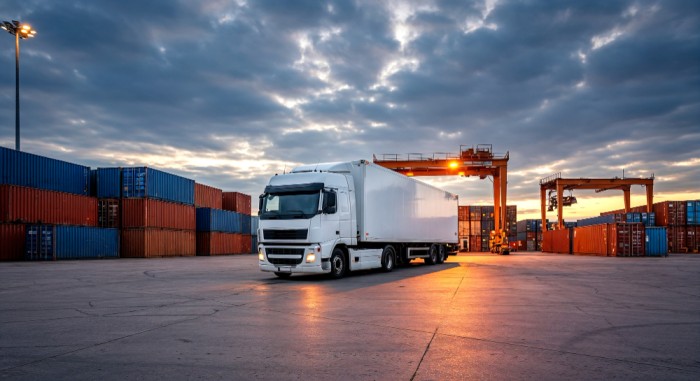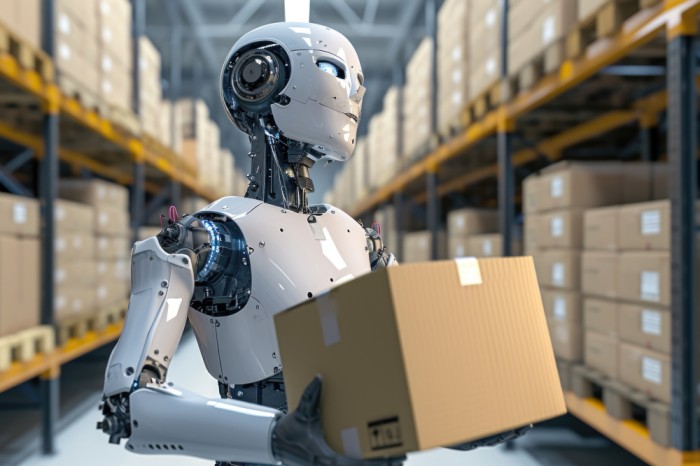How Logistics Companies Use AI to Improve Efficiency
The logistics industry is evolving rapidly, driven by growing demand for speed, precision, and real-time visibility. Manual processes and legacy systems are no longer enough to meet the expectations of today’s customers and supply chains. This shift has made artificial intelligence (AI) a powerful ally in transforming logistics operations.
AI is helping logistics companies automate key tasks, analyze massive volumes of data, and make faster, smarter decisions across the board, from warehouse management to last-mile delivery. It’s not just about cutting costs, it’s about building agile, resilient, and scalable logistics systems.
In this blog, we’ll dive into the specific ways AI is boosting efficiency across logistics and supply chain operations and why adopting it is becoming essential for long-term success.
Why Logistics Needs AI Now
The logistics industry faces unprecedented complexity, driven by shifting customer expectations, supply chain disruptions, and the need for faster, more cost-effective service. Traditional methods struggle to keep pace. AI offers the intelligence and automation needed to meet these challenges head-on.
Rising Customer Expectations: Today’s customers demand real-time tracking, instant updates, and next-day (or even same-day) delivery. AI helps logistics companies meet these demands through predictive routing, dynamic scheduling, and intelligent customer communication.
Increasing Supply Chain Disruptions: Global events, labor shortages, port delays, and geopolitical shifts are creating constant supply chain uncertainty. AI enables real-time risk monitoring and predictive forecasting to keep goods moving despite disruptions.
Operational Inefficiencies: Manual route planning, paper-based documentation, and reactive decision-making lead to wasted fuel, time, and resources. AI automates these processes, improving accuracy and reducing costs.
Data Overload: Modern logistics generates massive amounts of data, much of it underused. AI unlocks the value of this data, identifying patterns, optimizing processes, and driving smarter decision-making across the organization.
Demand for Sustainability: Sustainability is now a business priority. AI helps optimize routes for fuel efficiency, reduce idle time, and predict the most eco-friendly delivery methods, supporting greener logistics operations.
In short, logistics companies that adopt AI gain a competitive edge, becoming more agile, efficient, and customer-focused in a demanding and unpredictable world.
The Role of Artificial Intelligence in Logistics
Artificial Intelligence (AI) plays a pivotal role in modernizing logistics by enabling smarter, faster, and more automated operations. It acts as the backbone for decision-making, optimization, and process automation across the entire supply chain.
AI systems analyze vast amounts of data in real time from vehicle telemetry and traffic reports to customer orders and warehouse inventory levels. This allows logistics companies to anticipate demand, avoid delays, minimize fuel usage, and optimize asset utilization with unmatched precision.
Key Functions of AI in Logistics Include:
- Predictive Analytics: Forecasting demand, identifying risks, and planning resources proactively.
- Route Optimization: Real-time calculation of the fastest, most fuel-efficient delivery routes.
- Warehouse Automation: Using AI with robotics and computer vision to manage inventory, packing, and sorting.
- Autonomous Vehicles and Drones: Supporting the future of last-mile delivery and driverless transport.
- Customer Interaction: AI chatbots, real-time tracking, and personalized delivery updates.
- Intelligent Supply Chain Management: Making end-to-end logistics smarter from sourcing to fulfillment.
By integrating AI into logistics, companies are transforming static, reactive operations into dynamic, intelligent ecosystems that continuously learn and improve. It’s not just about keeping up, it’s about staying ahead.
Key Areas Where AI Improves Logistics Efficiency
Artificial Intelligence is reshaping every stage of the logistics value chain. From warehouses to delivery trucks, AI-driven solutions are making operations faster, leaner, and more reliable. Here are the key areas where AI delivers the most impact:
1. Route Optimization and Fleet Management- AI-powered algorithms analyze real-time data such as traffic, weather, and delivery windows to calculate the most efficient delivery routes.
It also helps manage fleet health with predictive maintenance based on sensor data and usage patterns.
Benefits:
- Reduced fuel consumption
- Lower delivery times
- Fewer breakdowns and delays
2. Warehouse Automation and Inventory Management- AI integrates with robotics and computer vision to automate sorting, packing, and picking. It also forecasts demand to optimize stock levels and reduce waste.
Benefits:
- Faster order fulfillment
- Accurate inventory tracking
- Lower labor and storage costs
3. Last-Mile Delivery Optimization- The last mile is often the most expensive part of delivery. AI helps reduce costs by enabling dynamic rerouting, smart delivery scheduling, and even autonomous delivery via drones and robots.
Benefits:
- Improved delivery success rates
- Personalized customer experiences
- Minimized idle time and failed attempts

4. Supply Chain Forecasting and Disruption Management- Machine learning models predict potential delays, inventory shortages, or supplier issues by analyzing patterns in real-time supply chain data.
Benefits:
- Proactive risk management
- Better demand-supply alignment
- Increased resilience to disruptions
5. Automated Customer Service and Communication- AI chatbots and virtual assistants provide instant responses to customer queries, delivery updates, and issue resolution, without human intervention.
Benefits:
- Reduced support costs
- 24/7 customer interaction
- Enhanced transparency and satisfaction
6. Intelligent Order Fulfillment- AI helps prioritize and assign orders for faster processing, optimize picking routes within warehouses, and match orders with the most efficient shipping options.
Benefits:
- Shorter delivery cycles
- Efficient use of resources
- Improved order accuracy
AI enables logistics companies to work smarter at every level – cutting costs, improving reliability, and delivering the kind of speed and precision today’s customers expect.
Conclusion
AI is no longer a futuristic concept in logistics; it’s a critical enabler of efficiency, agility, and innovation. From real-time route optimization to warehouse automation and predictive analytics, AI is helping logistics companies streamline operations, cut costs, and deliver faster, smarter services.
As customer expectations rise and supply chains grow more complex, businesses that embrace AI will gain a clear competitive edge. Whether you’re optimizing fleet management or forecasting demand, the time to integrate AI into logistics operations is now.


